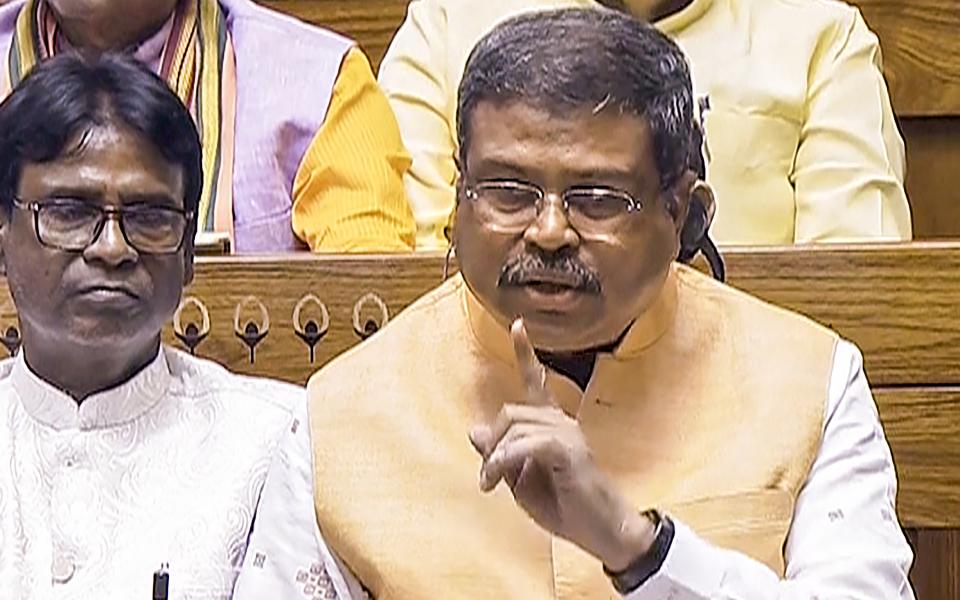New Delhi, Aug 1: Union Education Minister Dharmendra Pradhan on Thursday asked the opposition not to create fear among the Muslim community over an alleged lack of equal opportunities for minorities and asserted that the government did not differentiate between citizens.
Responding to a debate on the demands for grants for the Union education ministry in the Lok Sabha, Pradhan also asserted that the government did not impose any language.
Sharing figures to counter suggestions that Muslims and other minorities were not being given equal opportunities in education, the minister said, "Don't spread fear among Muslims, this will not last long."
Pradhan noted that the transition ratio from classes 5 to 6 among Muslim students stood at 89.2, which was close to the national average of 93.2.
"Aligarh Muslim University was set up in 1875 and no woman vice-chancellor was appointed in all these years. It happened during our tenure that a woman professor who studied at the same university was appointed as vice-chancellor … on the basis of merit … there is no charity," he said.
"Earlier, they used to say that you appoint people with RSS (Rashtriya Swayamsevak Sangh) affiliation. It is not like that … She is not from RSS affiliation … If a Muslim woman progresses on the basis of merit, we should be proud," Pradhan said.
"We (government) do not differentiate … It is just your perspective, your opinion … You might have an agenda of creating an atmosphere of fear and it is not going to work for long," he added.
The education minister said the higher education Gross Enrolment Ratio (GER) rose by 32 per cent in 2021-22 over 2014-15.
"The national average transition ratio from classes 5 to 6 is 93.2. Among Muslims students, this ratio is 89.2, which is close to the national average," he said.
"The transition ratio from upper primary to secondary school, which refers to students moving from classes 8 to 9, the national average is 88.8 and among Muslims it is 82.2," he added.
The minister said there was a need to encourage competency-based education and the new National Education Policy (NEP), 2020, was a step in that direction.
"NEP is not just a 60-page policy document. It is a philosophical element for the reconstruction of India, for increasing brotherhood … For solving all the problems of the world. The country accepts it unanimously today," he said.
The minister noted that 3.84 per cent of GDP was spent on education in 2013-14.
"In 2020-21, it increased to 4.64 per cent of GDP. The way the size of our economy is growing, we will soon reach 6 per cent and more GDP spending on education," he said.
Let the Truth be known. If you read VB and like VB, please be a VB Supporter and Help us deliver the Truth to one and all.
Panaji (PTI): As part of a crackdown against tourist establishments violating laws and safety norms in the aftermath of the Arpora fire tragedy, Goa authorities on Saturday sealed a renowned club at Vagator and revoked the fire department NOC of another club.
Cafe CO2 Goa, located on a cliff overlooking the Arabian Sea at Vagator beach in North Goa, was sealed. The move came two days after Goya Club, also in Vagator, was shut down for alleged violations of rules.
Elsewhere, campaigning for local body polls, AAP leader Arvind Kejriwal said the fire incident at Birch by Romeo Lane nightclub at Arpora, which claimed 25 lives on December 6, happened because the BJP government in the state was corrupt.
An inspection of Cafe CO2 Goa by a state government-appointed team revealed that the establishment, with a seating capacity of 250, did not possess a no-objection certificate (NOC) of the Fire and Emergency Services Department. The club, which sits atop Ozrant Cliff, also did not have structural stability, the team found.
The Fire and Emergency Services on Saturday also revoked the NOC issued to Diaz Pool Club and Bar at Anjuna as the fire extinguishers installed in the establishment were found to be inadequate, said divisional fire officer Shripad Gawas.
A notice was issued to Nitin Wadhwa, the partner of the club, he said in the order.
Campaigning at Chimbel village near Panaji in support of his party's Zilla Panchayat election candidate, Aam Aadmi Party leader Kejriwal said the nightclub fire at Arpora happened because of the "corruption of the Pramod Sawant-led state government."
"Why this fire incident happened? I read in the newspapers that the nightclub had no occupancy certificate, no building licence, no excise licence, no construction licence or trade licence. The entire club was illegal but still it was going on," he said.
"How could it go on? Couldn't Pramod Sawant or anyone else see it? I was told that hafta (bribe) was being paid," the former Delhi chief minister said.
A person can not work without bribing officials in the coastal state, Kejriwal said, alleging that officers, MLAs and even ministers are accepting bribes.





